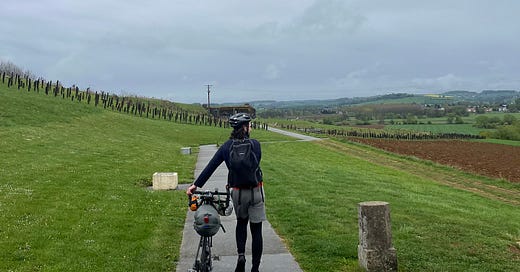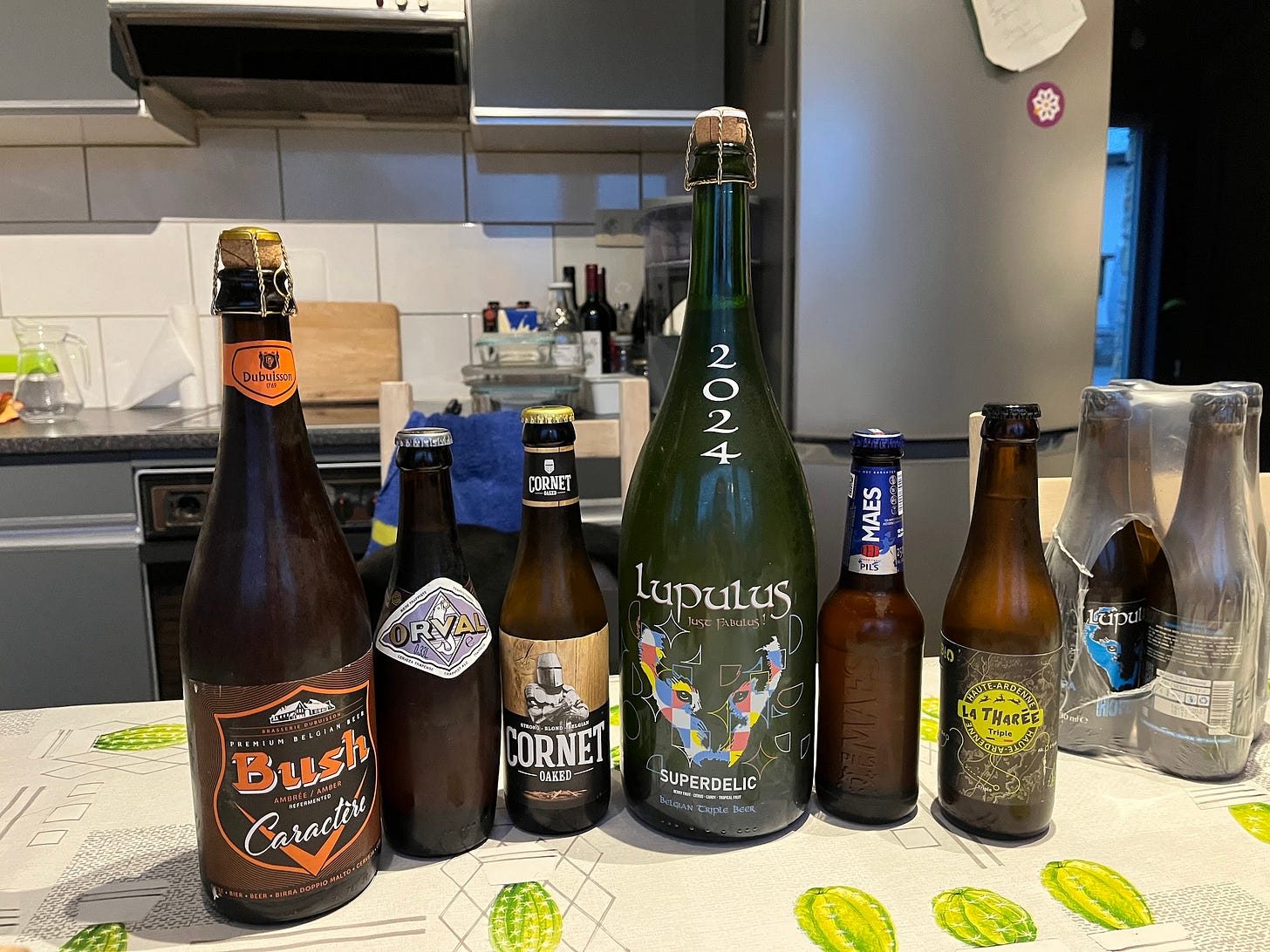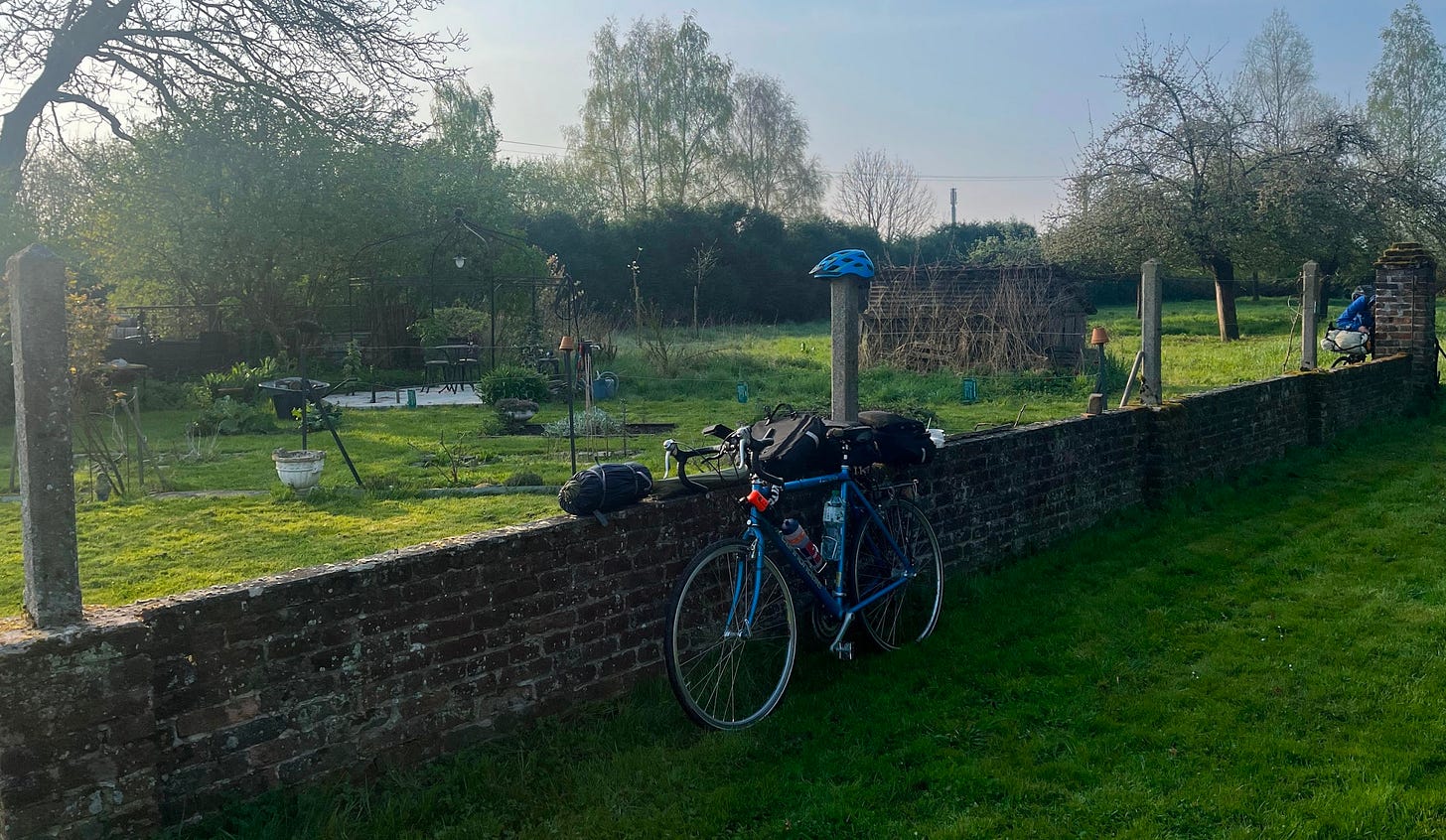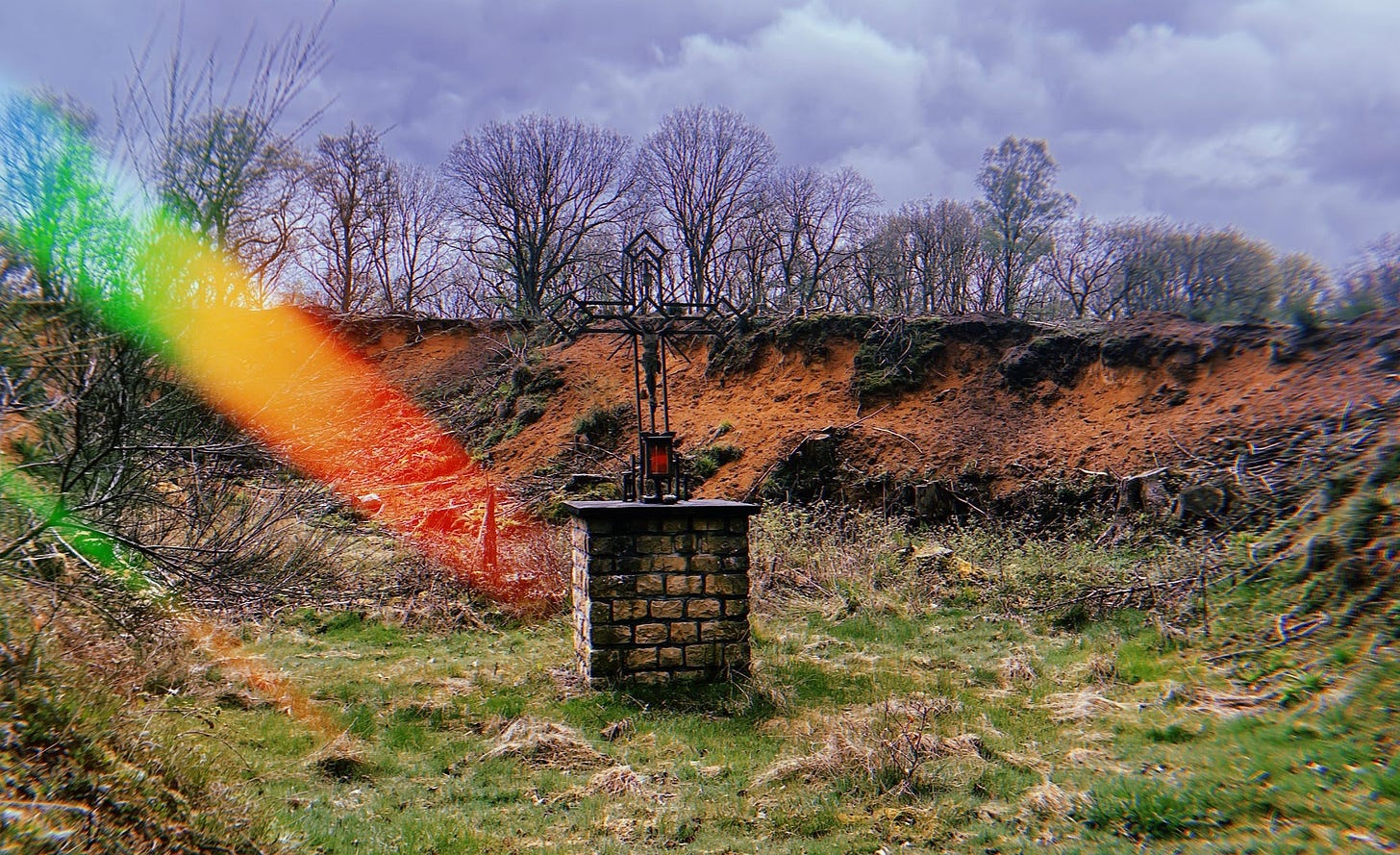A brilliant blue sky stretching in all directions, unadorned by even the faintest wisp of cloud. Trails become country roads become shoulders on the side of a highway become idyllic rides through the forest. Low-lying and smooth, the path glides next to the lake. Two ducks dive, stopping just before the water’s surface and let their wingtips skim and slow them down. A woman jogs past. An elderly couple smiles and waves “Hoi”.
Without hills, turns or even a traffic sign, the kilometers melt away. Düsseldorf is long behind us now; it’s been quite some time since the halfway point. There’s no decision to be made, onward is the only way to go.
No walls, no gates, no sign. No fanfare. Without our knowledge we’ve crossed into the Netherlands. In fact, we had made the crossing some time ago, now backtracking in order to commemorate the fact that we had cycled our way from one country to the next. But there was no celebration to be had, only a dismal reminder of days long gone.
Looking at the GPS one can clearly see where one territory ends, the next begins. In reality things aren’t always so clear. Coming from America I had expected something of more substance; I understand the free movement between Schengen countries but I still thought I’d see a fence masquerading as a delineation. Instead all we found were a few weathered plaques adorning some unremarkable brickwork. Signage in two languages explains the history of this airfield, explains how the Nazis came to occupy this land and use it to further a campaign of terror throughout Europe. An unassuming reminder of a period that mustn’t ever be forgotten, lest we find ourselves repeating it.

I’ve been to Luxembourg, but the fond words I have for the country come out waterlogged and cold. It was a short day spent cycling up hills that seemed to grow before me ceaselessly. To look for the end of our ascent was to invite a crick in the neck, an unwelcome addition to burning thighs and frozen toes. Reprieve couldn’t be found on the roadside; stopping meant you weren’t moving and that chill was far worse than continuing. Instead I would pray for a flat stretch so that I may wring out my gloves while coasting. At the end of it all we found ourselves warming up in the kitchen of a Belgian man named Francois.
Francois lives in a little town called Foy. In “Band of Brothers” they rhyme it with boy, but the locals say it like the word claw. It’s a village just outside of Bastogne, the city where the Battle of the Bulge took place. Rich in history and war stories.
Our Belgian savior showed us more kindness than we were due. We arrived in muddy jackets with waterlogged tents, just a couple of bums in need of anything that could improve our lot after the endless rain we’d been having all day. Seeing weary and desperate travelers, Francois offered up his shower, his spare room and a drying rack in front of the fire and our choice of his lovely collection of Belgian beer. A nice touch.
Arriving to the kitchen freshly showered and wearing the driest clothes we had, Mark and I began to tear into our supermarket suppers. Even cheese slices and day old bread will feel gourmet when you’re hungry enough. Francois was asking us about our trip, where we had been and what we’d been doing. We took turns filling in the details, but Mark seemed to be in better spirits than I was so I let him do as much of the talking as he wanted.
We had made the same journey, and in fact Mark had a harder time of it than I did. He was lugging a backpack around, and he fears his spine may never fully recover from that mistake. Some time shortly after lunch I found a second wind that never seemed to quite make it to his sails. Yet despite the favorable conditions I had during our ride, I sat at the table with a gnawing melancholy.
Any artwork depicting the North of France is right to have been made. Fertile hills rolling to the horizon and beyond sustain a great nation and provide a great bounty year after year. As the spring sun works itself higher and higher into the sky, day in and day out, the fields are happy to rise along with it. Vast and splendid fields of rape checkered the landscape, vast acres of glowing yellow flowers perfuming the air into a dreamy haze.
Though it lacks a sprawling network of smooth, dedicated cycle paths, the Somme region is still magnificent to experience via bike; gently rolling hills provide a variety to the day and a satisfying strain to the legs which is swiftly rewarded by descents through sprinklers. Tiny villages and gorgeous chateaus bring respite often enough, and the churches found in even the remotest locales are inspiring. Through all of this you’re never long from a reminder of the blood that recently stained these lands. Mixed in with all of the beauty are countless war memorials, grave sites and scars still held by the land and buildings. A century passes by scars remain.
Out there in the heart of the French countryside where centuries have come and gone and yet the people live much the same way there is a town decorated on every street corner with Australian flags. This doesn’t seem out of place when the people there recall with pride and admiration how their forefathers were liberated by the brave soldiers from down under. How many died so that those flags could now be flown?
Au carré is a bar found just after arriving in Bastogne when coming from Luxembourg. Google Maps will say it’s a coffee shop and a bar, but it would be more accurate to call it a monument. A monument to the American effort in the second World War. Every flat surface is dedicated to the sacrifice the men of the 101st Airborne made to liberate the city during the Battle of the Bulge - from portraits on the walls to display cases full of memorabilia, even the menu was full of pictures of American soldiers visiting the bar decades after the Nazi surrender.
With frostbite creeping ever closer, Mark and I all but fell into Au carré. We didn’t know what this place was, we were just desperate to find anywhere that would take us. With a puddle forming around my feet and helmet clutched awkwardly in my hands, I kindly asked the waitress if we could lock our bikes under their awning and get a couple coffees to warm up with. She said yes and pointed to a table next to the door. Maybe she was charmed by my dopey smile. The nearby patrons didn’t try to hide their stares as we began borrowing every empty chair within arms reach to hang rain gear on.
As we settled in and waited for our drinks, we fell into a silence. It wasn’t the first time Mark and I sat comfortably without a word. When you spend all of your time with one person, you learn that it’s okay to say nothing. But while Mark may have been happily checking his maps and reading through the menu, I was becoming more and more upset.
What shook me wasn’t the obvious distaste the young girl in a nearby booth had for us or the laughs I only assume we caused the dart players to have. I wasn’t bothered by the ascent, the kilometers we had yet to do, or even the prospect of sleeping in a puddle once we finally arrived at our destination for the night. What was gutting me in that bar was the company of dead Americans staring down at me from every wall.
The bar was warm and dry and so I was able to slowly nurse a little feeling back into my feet. In return, a deep and profound sadness took root. As I looked across our table I could see Mark, and behind him were dozens of dead Americans. I was able to spend my time cycling across borders without the slightest bit of opposition because so many of them died reclaiming these lands. At just 24 I had probably outlived most of them.
On those walls I saw my childhood friends, my cousins, my would be brothers. They wore bright grins or solemn expressions, all dressed to the nines in their military uniforms. Buttons polished and faces freshly shaven so the Army would have something honorable to send home to mom and dad when they were inevitably cut down. And for what?
They fought for liberty, for Democracy, for the right to an honorable life. They fought so that millions would have the right to define their own lives, so that their children and grandchildren could inherit a world of freedom and opportunity. They fought because a horrible crime against our allies, against our values, against humanity was being committed. They fought, I would argue, for something worth dying for.
It seems the vulgarity of war taints everything it touches. Impressions felt and visions gleaned even without memorials marking a battle, cemeteries honoring the dead, destruction haunting the living.
The Ardennes are a region of vast forests and sleepy mountains. They don’t loom as tall and splendid as the Alps do further south, yet there’s something reminiscent of a fairy tale in those woods. Around every bend you expect to find a small cabin wafting smoke out from the chimney. The trees grow together densely and bring a dusky coolness to the area.
The path forward is decided by the terrain. Climb a mountain with a stream as your guide, switchback at a lake to resume your ascent.
Farmers and others work these lands. Tread marks coming down through the hills and between the trees make that clear. It’s easy to imagine something else, something far more sinister scarring the earth.
The land and neutrality of a nation means little when the thirst of conquest is all consuming. Belgium, France and half of Europe would fall before the onslaught of the Nazi Blitzkrieg. With tanks and foot soldiers barreling through any and every obstacle it’s easy to imagine their assault following the same paths that commuters and villagers now make use of at their leisure. Surely, though, the densely packed trees growing on the sides of steep hills would act as a deterrent and keep those residing here safe.
One hopes for sense and stability.
Bastogne had seen brutal fighting during World War II. The people there insist on remembering. Remembering the occupation, remembering the shelling and ceaseless gunfire, remembering the death and destruction. Remembering allies that came in the darkest hour.
As we left the city we cycled past countless monuments to the war, streets and shops named after the heroes of the day, battlegrounds preserved for their historic value and graves to the fallen. The Belgians still feel a great sense of fondness and loyalty to us Americans. They’d tell me that without our help they might still be subjugated to this day. For nearly a century they’ve looked over the Atlantic to friends and allies they’d salute and be proud to support.
As Francois poured our chalices full of this beer and that, he pleaded the Belgian case to an American with open ears. Today they still cling to these feelings of camaraderie and respect, but they fear for their allies. They fear for us, for the Americans. We spent a century fighting in the old world, and then resupplying and rebuilding our progenitors so that we could welcome them on even footing to the 21st century. Through trade and diplomacy, our countries flourished together. I inherited a world rich in potential and possibility, a world that was happy to see an American visiting and would welcome me with hospitality. I worry about the world my nieces and nephews will soon inherit. Will the blood of their grandfathers be washed away by the callous indifference of their fathers?
Thank you for reading. I’ve been working on this for over a month, and I finally felt like I said what I needed to.
If you enjoyed this, please leave a like or a comment. That little interaction goes a long way in encouraging me to write more.
If you know someone who you think could benefit from getting out of their comfort zone and seeing the world, go ahead and recommend them this blog. It’ll make me feel good, plus I have some rewards for people who help the blog grow, such as bonus posts and personalized playlists.
Thank you.








